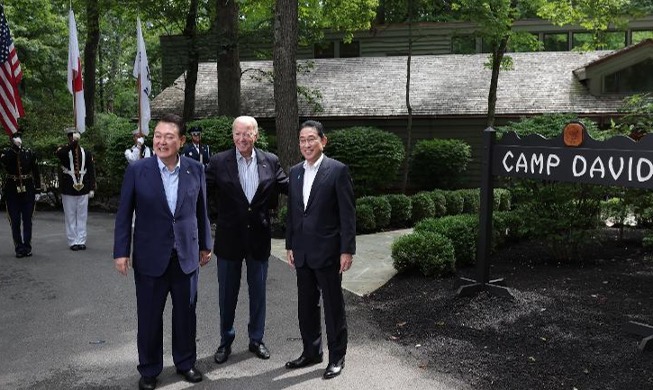-
 Korea.net's 24-hour YouTube channel
Korea.net's 24-hour YouTube channel- NEWS FOCUS
- ABOUT KOREA
- EVENTS
- RESOURCES
- GOVERNMENT
- ABOUT US

President Park Geun-hye and Chinese President Xi Jinping struck the Korea-China free trade agreement (FTA) on November 10 in Beijing. The two leaders held summit talks in the Great Hall of the People in the Chinese capital and announced the FTA afterward. Trade ministers from both countries held a signing ceremony for the free trade pact with the two leaders standing by.
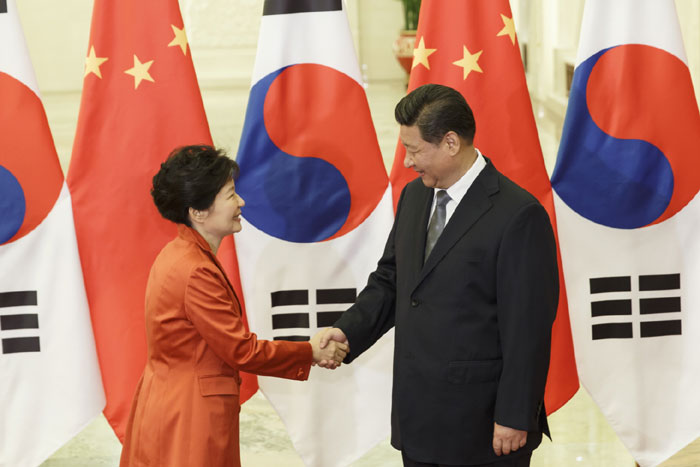
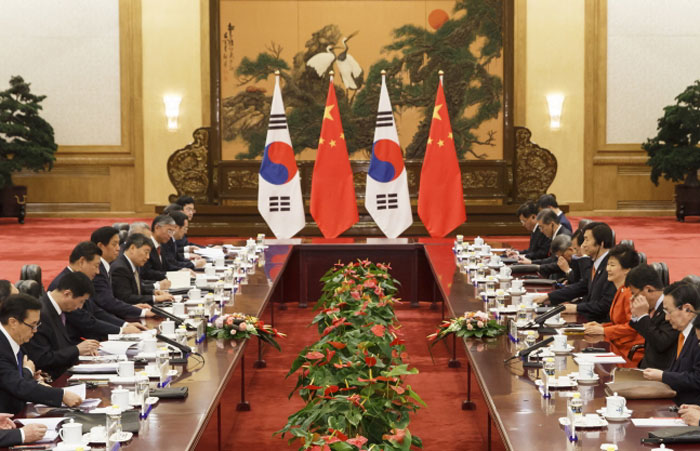
President Park, currently visiting Beijing to attend the Asia-Pacific Economic Cooperation (APEC) meeting, said, “I am glad to announce the conclusion of the two-year long negotiations for the Korea-China FTA. I hope both countries can work out more details and swiftly carry out the remaining procedures to sign the deal and allow it to take effect.”
“Striking the Korea-China FTA will be good news for the world economy, which suffers from a sluggish recovery and low growth. I hope both countries can maintain such cooperation and further develop their strategic cooperation and partnership,” said President Park.
Quoting a Chinese idiom praising the closeness of an old friendship, "交情老更親," she said, “As I continue to hold meetings with President Xi, the Korea-China relationship has deepened.”
“China and Korea are good neighbors and good partners. I hope both countries can actively make efforts to achieve lasting development in terms of cooperation and exchanges across various sectors,” President Xi said.
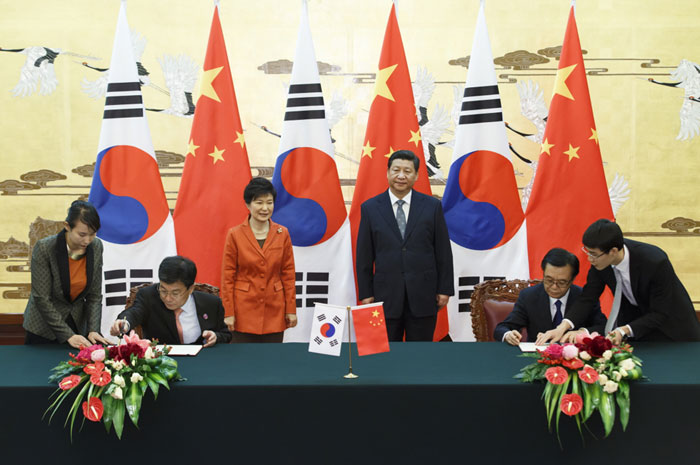
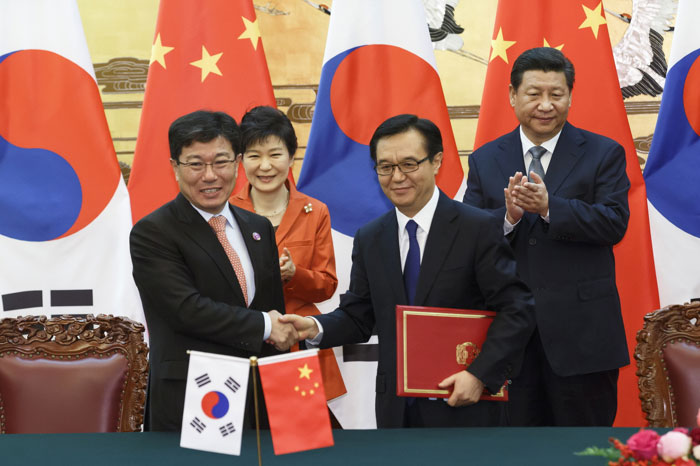
Significance of striking Korea-China FTA
Korea and China officially declared the conclusion of free trade negotiations on November 10 and agreed to fine-tune the details within the year. It took 30 months since the first round of negotiations began in May 2012.
Once the free trade deal is concluded, tariffs worth USD 8.7 billion imposed on Korea’s traded goods in China will be lifted immediately. Tariffs imposed on Korea’s traded goods in China worth a more significant USD 45.8 billion will be lifted 10 years later, after the free trade deal takes effect.
The free trade pact struck by the two countries is composed of 22 chapters covering all economic sectors, ranging from goods and services, investment, finance and communications. Both countries agreed to open their markets for more than 90 percent of the goods traded between them.
China agreed to eliminate tariffs on 91 percent of all imported goods, or 85 percent of its imports by value, and Korea agreed to lift tariffs on 92 percent of all its imported goods, or 91 percent of its imports by value, within the next 20 years. China included finance, communications and e-commerce in the free trade deal for the first time. Both countries will finalize the details within the year, officially signing the deal and making it effective next year.
Cheong Wa Dae said that the Korea-China FTA is Korea’s 13th free trade deal to date. The president's office added that, thanks to the most recently deal, Korea’s range of business partners has now expanded to cover 73.2 percent of the world’s GDP, equivalent to the third largest world in the world.
Cheong Wa Dae added that, “The Korea-China FTA will offer an important turning point for Korea by changing its export structure, focusing now on consumer goods with high added-value, different from the existing one which focuses on exporting processed trade goods. When the Korea-China FTA is finalized, approximately USD 5.44 billion can be saved from tariffs annually. This is 5.8 times as large as that in the Korea-U.S. FTA and 3.9 times as large as that in the Korea-EU FTA."
By Yoon Sojung
Korea.net Staff Writer
Photos: Cheong Wa Dae
arete@korea.kr

President Park Geun-hye (left) and Chinese President Xi Jinping shake hands prior to summit talks on November 10.

President Park Geun-hye and Chinese President Xi Jinping hold summit talks on November 10.
President Park, currently visiting Beijing to attend the Asia-Pacific Economic Cooperation (APEC) meeting, said, “I am glad to announce the conclusion of the two-year long negotiations for the Korea-China FTA. I hope both countries can work out more details and swiftly carry out the remaining procedures to sign the deal and allow it to take effect.”
“Striking the Korea-China FTA will be good news for the world economy, which suffers from a sluggish recovery and low growth. I hope both countries can maintain such cooperation and further develop their strategic cooperation and partnership,” said President Park.
Quoting a Chinese idiom praising the closeness of an old friendship, "交情老更親," she said, “As I continue to hold meetings with President Xi, the Korea-China relationship has deepened.”
“China and Korea are good neighbors and good partners. I hope both countries can actively make efforts to achieve lasting development in terms of cooperation and exchanges across various sectors,” President Xi said.


Trade ministers from Korea and China sign the Korea-China FTA, with leaders from Korea and China standing by.
Significance of striking Korea-China FTA
Korea and China officially declared the conclusion of free trade negotiations on November 10 and agreed to fine-tune the details within the year. It took 30 months since the first round of negotiations began in May 2012.
Once the free trade deal is concluded, tariffs worth USD 8.7 billion imposed on Korea’s traded goods in China will be lifted immediately. Tariffs imposed on Korea’s traded goods in China worth a more significant USD 45.8 billion will be lifted 10 years later, after the free trade deal takes effect.
The free trade pact struck by the two countries is composed of 22 chapters covering all economic sectors, ranging from goods and services, investment, finance and communications. Both countries agreed to open their markets for more than 90 percent of the goods traded between them.
China agreed to eliminate tariffs on 91 percent of all imported goods, or 85 percent of its imports by value, and Korea agreed to lift tariffs on 92 percent of all its imported goods, or 91 percent of its imports by value, within the next 20 years. China included finance, communications and e-commerce in the free trade deal for the first time. Both countries will finalize the details within the year, officially signing the deal and making it effective next year.
Cheong Wa Dae said that the Korea-China FTA is Korea’s 13th free trade deal to date. The president's office added that, thanks to the most recently deal, Korea’s range of business partners has now expanded to cover 73.2 percent of the world’s GDP, equivalent to the third largest world in the world.
Cheong Wa Dae added that, “The Korea-China FTA will offer an important turning point for Korea by changing its export structure, focusing now on consumer goods with high added-value, different from the existing one which focuses on exporting processed trade goods. When the Korea-China FTA is finalized, approximately USD 5.44 billion can be saved from tariffs annually. This is 5.8 times as large as that in the Korea-U.S. FTA and 3.9 times as large as that in the Korea-EU FTA."
By Yoon Sojung
Korea.net Staff Writer
Photos: Cheong Wa Dae
arete@korea.kr
Most popular
- First Korean-style 'taxi driver' diner opened in New York
- Foreign tourist editions of unlimited transit card coming in July
- 76 national heritage sites to allow free admission from May 15
- Africa's appeal on full display at downtown festival in Seoul
- Troupe's show marks 60 years of energy ties with Kuwait









